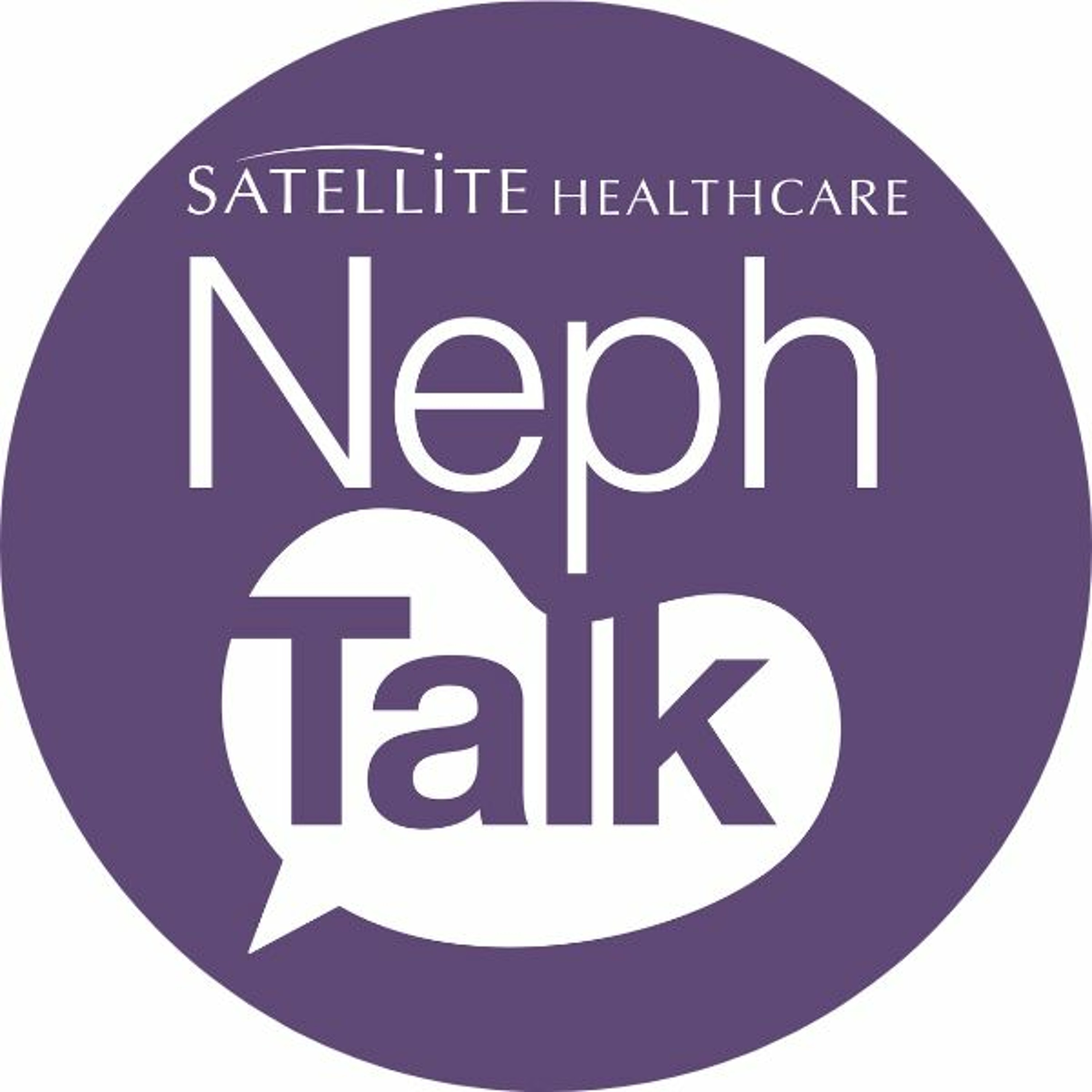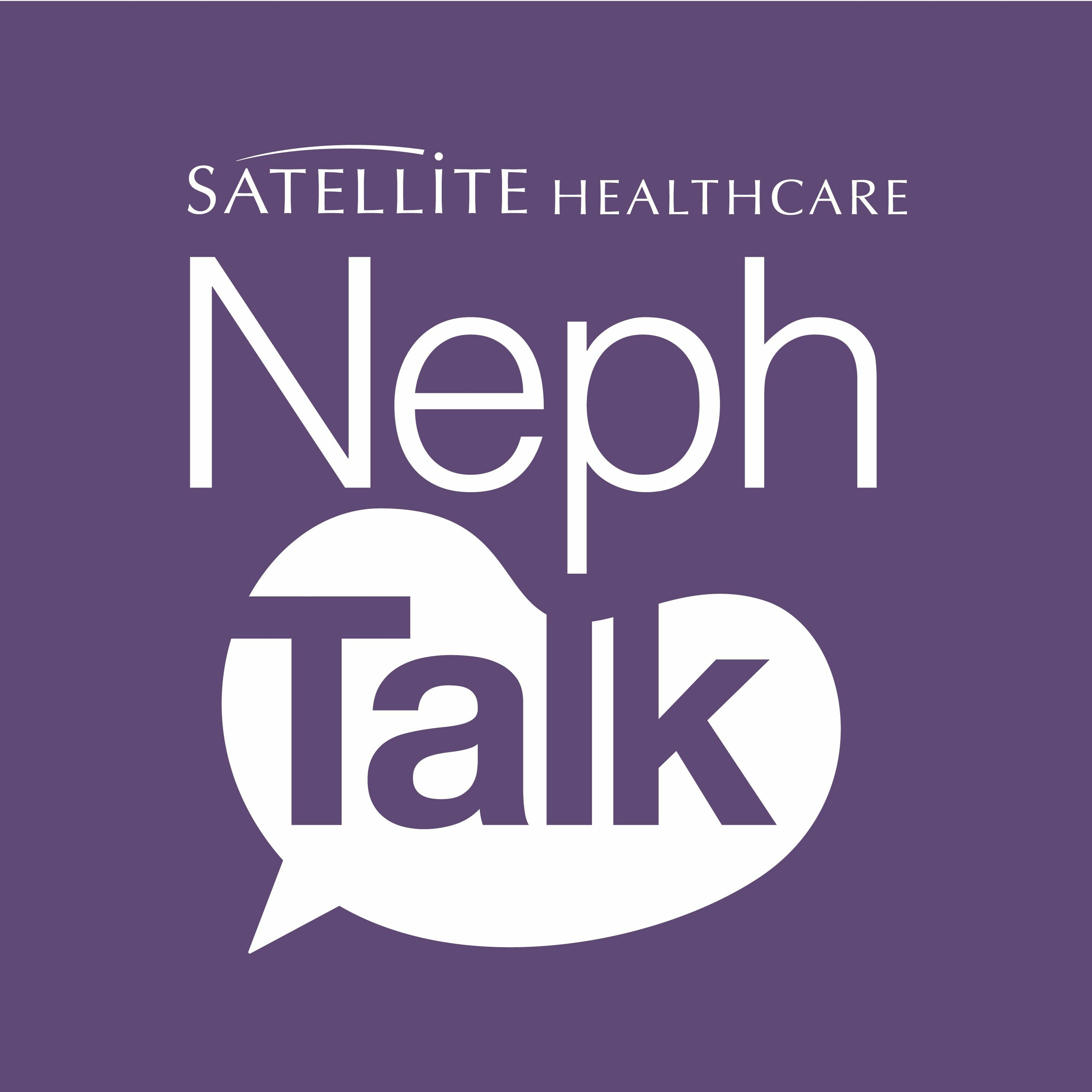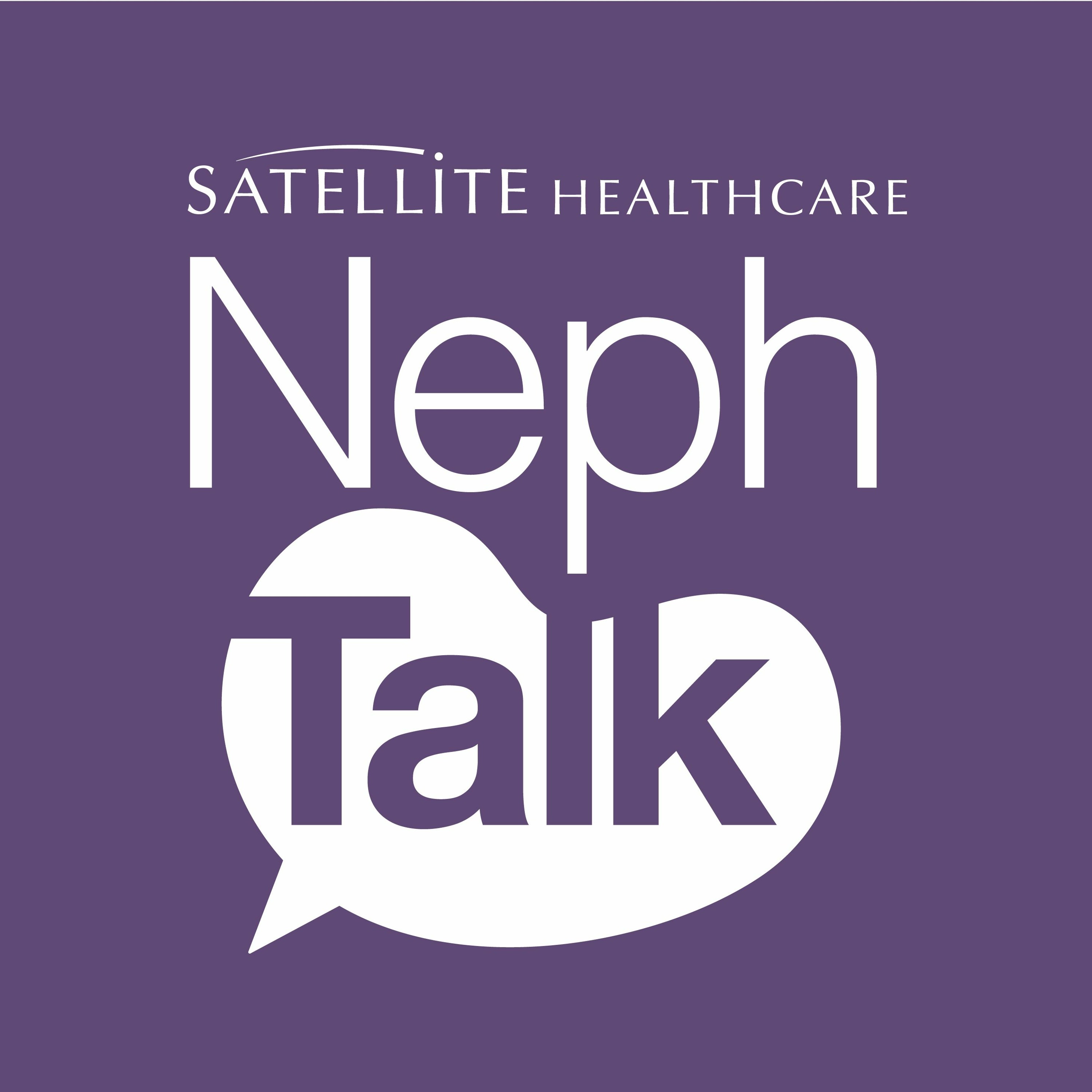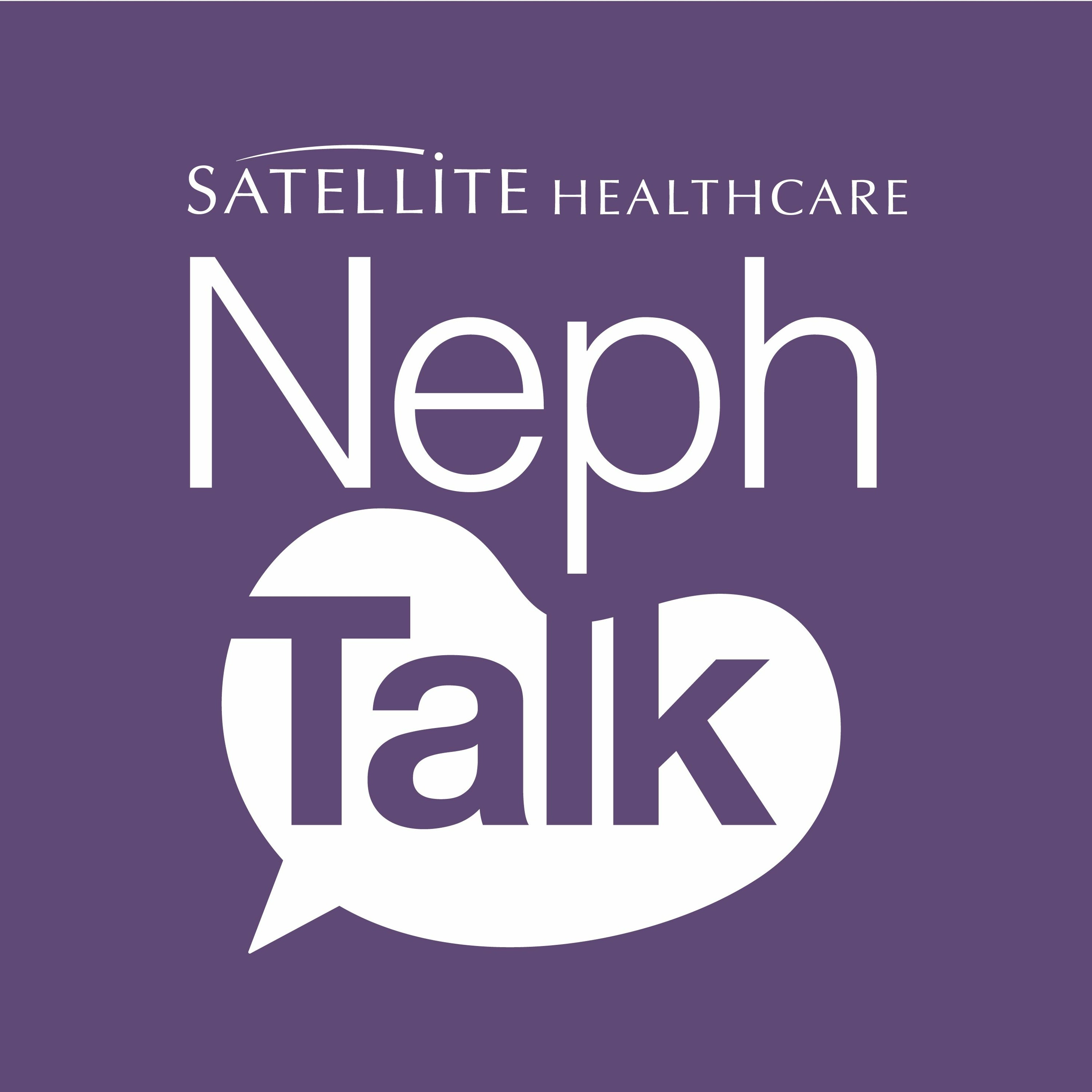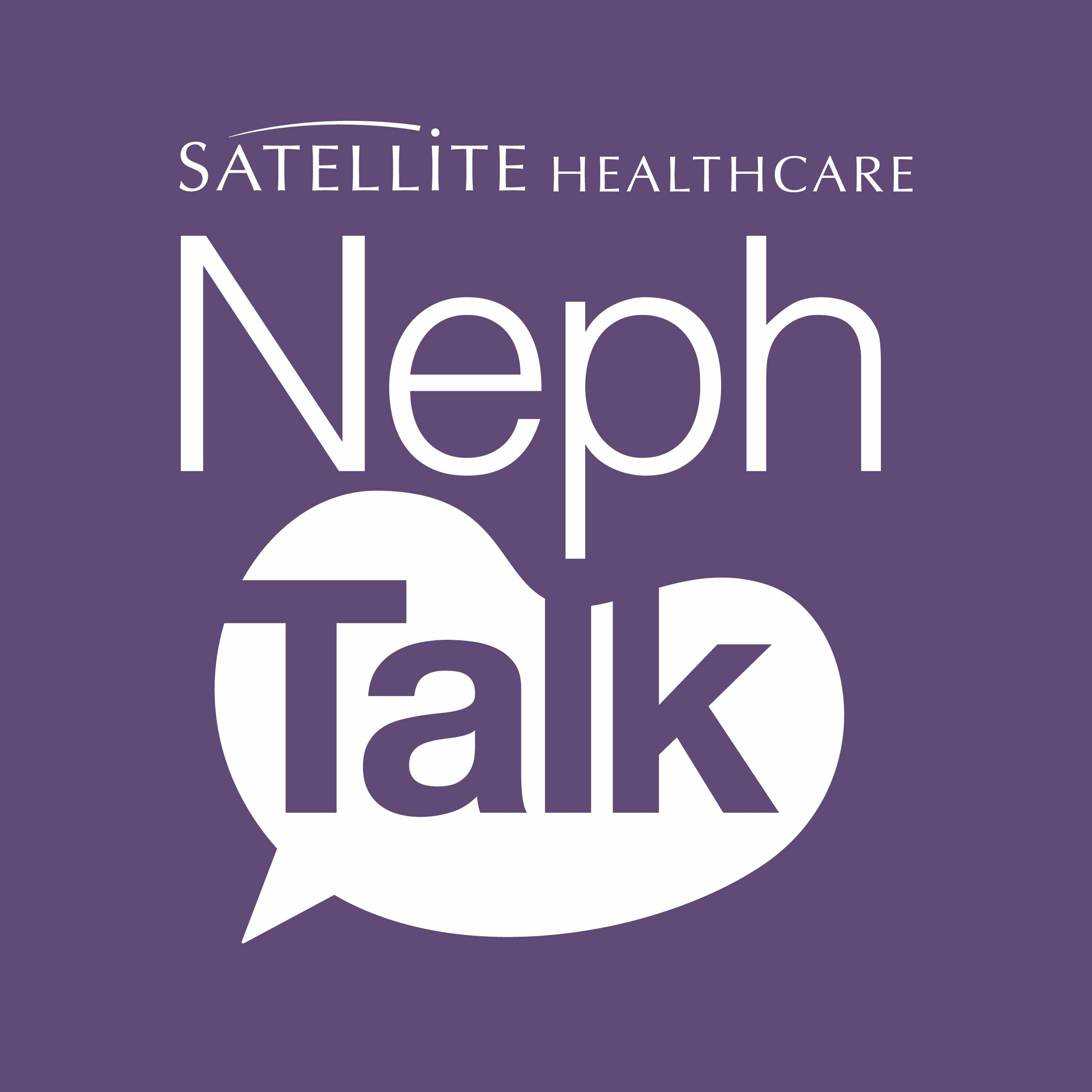Discover NephTalk
NephTalk

NephTalk
Author: a nephrology podcast by Satellite Healthcare
Subscribed: 57Played: 297Subscribe
Share
© All rights reserved
Description
We’re in patient care – and we want to talk about it with you! That’s the simple foundation of our new podcast-leading discussion forum, NephTalk. And it’s just for Nephrologists.
NephTalk will deliver relevant and intriguing podcast interviews and reports that highlight patient stories, industry advancements and Nephrologist best practices.
NephTalk will deliver relevant and intriguing podcast interviews and reports that highlight patient stories, industry advancements and Nephrologist best practices.
44 Episodes
Reverse
https://hdexcellence.org/
On the new NephTalk, Dr. Graham Abra, MD, Satellite Healthcare’s Chief Medical Officer for Home Therapies; and Ken Leidner, Chief Growth Officer at Satellite Healthcare, discuss HDAE, an educational, immersion program created through a collaboration between Stanford Medicine, the University of California Davis Health and Satellite Healthcare. HDAE is designed to provide Nephrology Fellows with a wide and deep understanding of the value and application of home dialysis as a therapeutic option to promote health and wellness for people with end stage kidney disease.
“The number one question I get from patients is, 'How can I change my diet to improve my kidney function or slow progression of kidney disease?' I can do the medical therapy in terms of other comorbid and disease management. But honestly, I don’t have the knowledge base that my colleagues in nutrition have. New Day's registered dietitians provide ongoing medical nutrition therapy and that’s a game changer.”
Dr. Randolph Chen, MD, Nephrologist Medical Advisor, Satellite Healthcare
Rory Pace, MPH, RD, CSR, FAND
Director of Nutrition Services, Satellite Healthcare General Manager, New Day Nutrition
“The big shift is to try to keep people off of dialysis. If we can move upstream and better manage and provide care for CKD patients, chronic kidney disease patients; slow the progression, and then make sure they have optimal starts, and encourage more transplantation and home dialysis, then we're going to improve patient outcomes and we're also going to be saving costs. Both of those together is a win-win.”
Dr. Kay Ghista, Vice President
CKD and Transplant Care Management, Satellite Healthcare
“We always have to ask ourselves, ‘What is of value to the patient? What does the patient need?’ The Kidney Care Connection will answer these needs, not by telling them what we can offer, but them telling us what they need to live well. That is revolutionary. That is transformative.”
Dr. Brigitte Schiller, MD, Chief Medical Officer, Satellite Healthcare
with Dr. Wael Hussein, MD, Vice-President, Research and Development, Satellite Healthcare
Christopher Springmann: You have said, Dr. Schiller, and I'm quoting here, "One way of thinking about how to receive the best healthcare possible is to ask ourselves, 'What would we want for our loved ones?'" With the Kidney Care Connection model, you've said, you're very confident that this will be a better care model, more attention, more compassionate and calming. That's quite a mandate.
Dr. Schiller: We're an ambitious and well-intended organization and have been for 40-plus years. I'm glad you bring this up because this is, actually, the mantra of Satellite Healthcare. We lead as a caring dialysis organization. That is our differentiator. Approaching it from this very personal aspect makes a better care model, and we have brought the experience of several nephrologists, many healthcare-experienced professionals, to this concept of the Kidney Care Connection.
CS: Dr. Hussein, I've read several of your quotes in which you discuss starting dialysis, and I'm quoting here: “ . . . where new patients are thrown into the mix, overwhelmed with the educational needs. And you've quoted patients who describe starting dialysis—well, they have used the word "terrifying." Is it your intent that the Kidney Care Connection will help alleviate fears and anxieties that patients have expressed in the past?
Dr. Hussein: The current dialysis model in the center is based on fast and efficient and has to be safe delivery of hemodialysis care, and that means a very rapid turnaround and getting the patients on and off very quickly. That might be okay for somebody who's used to the type of care that they're getting. For somebody who's new, coming in for the first time, patients describe it to us that it's a very fearful situation, that they feel like their life might be ending. They don't know what to expect. You do not want to start that period of your life in that situation, in that scenario. The Kidney Care Connection is something similar to a transitional care unit but in a more advanced way, and that is to have more staff dedicated to that period of your life.
Featuring Dr. Brigitte Schiller, MD, Chief Medical Officer, Satellite Healthcare; and Dr. Wael Hussein, MD, Vice-President, Research and Development, Satellite Healthcare
“We always have to ask ourselves, ‘What is of value to the patient? What does the patient need?’ The Kidney Care Connection will answer these needs, not by telling them what we can offer, but them telling us what they need to live well. That is revolutionary. That is transformative.”
https://www.satellitehealthcare.com/podcasts/building-trust-earning-trust
“I really enjoy building relationships with my patients. I typically meet them when they have a serious problem. And I’m normally able to just fix it and take care of it. It’s one of the most fulfilling things about my practice, to be able to follow up with these patients and see their progress.”
Dr. Lindsey Pierce, MD
Medical Director
Tri-County Vascular Center
(From program trailer). Are Nephrology practices ready for the new world of Value-Based Care or VBC? On the new NephTalk you’ll learn that VBC is the way medical reimbursement will be determined in the future.
Tell me about the responses you're receiving from potential early adopters of the NNA, the National Nephrology Alliance?
As we've talked to several dozens of groups across the nation, there have been some consistent themes, and the word "Crossroads" has come up probably in every conversation.
Crossroads?
Every practice we've talked to has brought that up that they see the transition from fee for service to value- based care. They've all said that the path forward is uncertain for them, and they're looking for partners, for options.
That’s Ravin Bisla, Senior Vice President of Growth Initiatives for Satellite Healthcare and Chief Development Officer for the National Nephrology Alliance.
Where do you envision the NNA in the next two to five years?
To a large size where we can start to advocate for our patients at a policy level. So that we can say, we have 200-300 physicians.
You're talking about developing clout and influence.
That's an accurate way to assess that. In creating NNA, part of what we're saying is that we can join together and have a much, much louder voice by acting as one.
“Empathy and simply listening are sometimes the most important tools and skills that we can employ with our patients. It's about the patient and not about us or our goals. Even if our goals are for the patient's best well-being and health, we need to remember the patient is at the heart of what we do.”
Emily Watson, MSW, LCSW; Director of Social Work, Satellite Healthcare
“The push to grow Satellite Healthcare throughout the US is greater than ever. The big reason for ‘Why now?’ is our new Executive Team. Satellite has a solid footprint on the West Coast, a presence in Texas, Tennessee, and New Jersey. With my experience on the East Coast, it was a natural fit.”
Dan White
Vice President of Business Development
Satellite Healthcare
“There was a mix of excitement, worry, nervousness, because my dad, again, will be giving me the gift of life, so you can’t ask for more. Just being on dialysis for about eight months and then getting to this [transplant] moment is just a great milestone to achieve.”
Rochelle Dispo, Marketing Communications Coordinator for Satellite Healthcare - and kidney transplant recipient from her donor dad
Yes, it’s win, win, win. It’s win for Satellite. It’s win for the volunteers. And it’s win for the patients and the community as a whole. We are trusting volunteers to bring their unique perspectives, their time and talents to the work that we do. And that increases our capacity not only to help more people, but to have that multiplicity of perspectives.
Christopher Springmann: That’s Paula Allen, Satellite Healthcare’s Volunteer Program Specialist, who is joined by Emily Watson, Satellite’s Healthcare’s Director of Social Work.
CS: Yes. It’s good to have both of you on NephTalk. Thanks.
Emily Watson: ‘Morning. Thanks for having us.
Paula Allen: Thank you, Christopher.
CS: Can you tell me how the idea for bringing volunteers on board at Satellite Healthcare was initiated and where this program is going?
EW: Satellite, being a non-profit, is in a unique stance. Leadership at our organization has long been interested in differentiating Satellite from the rest of the crowd in more ways than just our great quality. Looking at how we can serve our patients a little bit more one-on-one is where the idea of having a Volunteer Corps came from. We spent some time working on it, actually, last year, in 2020, in the middle of a pandemic and realized that we need special knowledge. We were gifted the opportunity to look for someone to bring on board to do that. And that’s how we found Paula.
“Living organ donors, in giving the gift of life, is truly love and compassion in action. They are our heroes. There’s no bigger gift that I can think of. It’s just incredible.”
Christopher Springmann: That’s Dr. Kay Ghista, Satellite Healthcare’s Vice-President of Chronic Kidney Disease and Transplant Care Management
CS: Kay, thank you so much for joining us today on NephTalk.
KG: Hello, Chris. It's a pleasure to be here. Thank you.
CS: We'll be discussing the journey to kidney transplantation, what Satellite is doing to make transplant a reality for patients, and how this relates to the Executive Order on Advancing American Kidney Health. You can't talk about kidney transplantation in America, and of course dialysis, without talking about numbers, facts, and statistics. The two numbers that really pop out to me are that every year, 100,000 people start dialysis. That's an enormous number, isn't it?
KG: Yes, it is. And tragically, 20 percent die within a year, Chris, and almost 50 percent of die within five years. That's a reality.
“Emotions and connecting with somebody is as much about what you say as how you nonverbally communicate, how your body and your face connects or transmits your feelings to someone else. I’m trying to show them that I’m smiling with just my eyes. Smiling by really connecting through visual contact, through eyes . . . became one of the main ways we can connect with our patients.”
Emily Watson, MSW, LCSW; Director of Social Work, Satellite Healthcare
Vida Goudarzi is an Expert Nephrology Dietician at Satellite Healthcare and her world has been upended by Covid-19, but her mission and that of her team remains the same: Keep it personal, stay engaged and insure that their patients live the best life possible.
CS: "Let's Stop Playing the Race Card in eGFR Reporting.” That's the provocative title of your article in the Clinical Journal of the American Society of Nephrology, and it certainly got our attention. Are you surprised?
VG: Pleasantly, no, not surprised. I was hoping for that.
CS: First, Dr. Grubbs, what is eGFR, and how does it relate to patients, especially Black patients, who could be diagnosed with declining kidney function?
VG: eGFR stands for Estimated Glomerular Filtration Rate, and that's all fancy medical language that simply means how well are your kidneys filtering your blood. We have an equation that uses a simple blood test, the creatinine, to factor into this equation and, and help us figure out how well the kidneys are filtering.
CS: Why are you concerned, especially in the area of achieving an accurate unbiased patient diagnosis, that the current criteria for GFR testing is deeply flawed without a scientific basis and may even be racist? What are the consequences?
VG: I definitely think so because, when the equation was developed, the researchers were considering all the things that they thought might affect how the kidneys filter this creatinine, which is produced at a pretty steady rate in our bodies every day, and it comes primarily from muscle cells, like waste from our muscle cells. In determining what things might affect creatinine, they thought about, okay, a person's gender because men tend to have higher muscle mass than women and age because younger people tend to have higher muscle mass than older people. And race, this is where they made the big leap that Black people have higher muscle mass than white people.
Hello, I’m Christopher Springmann, and for patient Nieltje Gedney, her personal chronic kidney disease journey has been challenging, as she tells this month’s NephTalk about how she finally discovered and enthusiastically embraced home hemodialysis.
And I would have chosen to die, except that I was taking care of my mother, and the second was the fact that the nephrologist in the hospital who saw me on an emergency basis told me about home dialysis. And in all the years that I had been struggling against CKD, kidney disease, no one ever mentioned that option. Those two things really saved my life.
Nieltje’s experience compelled her to become an outspoken patient advocate for Home Dialyzors United - and she is ferociously independent.
Well, that is true. I dialyze to live. I don't live to dialyze. I have made it a point to live my life as normally as possible. I call it my “oil change.” The few times a week that I do my dialysis treatment, is when I relax. I kind of go into my zone. I totally chill out. And I am
revitalized.
Please click on the NephTalk link below, listen and watch, and share the program with colleagues, family and friends. Thanks for listening.
Debra Elmore: The sooner that they join when they find out that they have decreased kidney function, the better. Most of the people that come to our support group tend to be either they just found out that they have some sort of kidney problem, and they want to learn about dialysis and transplant.
Christopher Springmann: That’s Debra Elmore, Executive Director of the San Francisco Bay Area Association of Kidney Patients, a support group reaching over 1100 patients, family members and nephrologists. Debra is joined by Phillip Wyche, President of the BAAKP.
CS: You both have had exhaustive journeys with CKD, chronic kidney disease, and you both have had kidney transplants. You could have left the past behind, but you're looking forward with the Bay Area Association of Kidney Patients or BAAKP. What work do you need to do?
Phil Wyche: Well, there's our organization, we try to promote self-awareness, self-preservation, and continue the fight. When I first found out I was having kidney issues and kidney failure, I joined this organization to get educated, and the more I got educated and it helped me to receive my kidney, after an eight-year struggle. I remained on the board and to help educate those that come to our support group.
This is NephTalk. I’m Christopher Springmann and let’s get cooking!
Hi, I'm Dr. Shusterman, The Cooking Doc. Now, you're heard me say, "Change Your Buds" in my videos, but what does Change Your Buds actually mean? It means learning to change your taste buds so they actually enjoy healthy food. But this doesn't happen quickly. It takes time.
You have to teach your taste buds to like healthier things; whole grains, vegetables, fruit. And that's what The Cooking Doc is all about. It's about teaching you to make those things actually taste good. And once you make these changes, you won't have to fight as hard against your cravings for unhealthy foods. Your cravings will actually go away over time.
VO: This is an encore presentation of NephTalk from Satellite Healthcare.
CS: You’re suggesting that people become depressed, discouraged, and sedentary, not necessarily in that order? Am I exaggerating here?
SA: Once they start dialysis? No, you’re not exaggerating. We know that 50 percent of patients on dialysis can barely walk a block.
CS: Really?
SA: Yes. And so, if we can catch them before they have to go through that insult, we’re really hoping that we can keep them in a positive cycle, where they have more self-efficacy. They have more confidence in their physical and mental capacity.
(CS ) That’s Dr. Shuchi Anand, MD, who received a Satellite Healthcare research grant, inspired by provocative questions, like: What would happen if we, as nephrologists, intervened early in the patient’s chronic kidney disease journey before they started dialysis, by prescribing an exercise program? Would that better prepare patients for the physical, social and emotional challenges of the dialysis experience and ultimately make them healthier candidates for a transplant?
Dr. Anand, will be joined by several of her investigators, including fellow Stanford Medicine nephrologist Dr. Susan Ziolkowski, MD; and co-principal investigator Dr. Felipe Lobelo, MD, a medical epidemiologist at Emory University in Atlanta, Georgia, who’s also working with a diverse groups of patients, including a significant African-American population.
Dr. Tara Chang, MD, is a nephrologist and a Satellite Healthcare research grant recipient who possesses three qualities I really admire: Curiosity, asking the big “why not?” questions; creativity, the kind you apply to problem solving; plus she’s known as a great collaborator and an inspiring partner.
Dr. Chang is an Assistant Professor of Medicine at the Stanford University Medical Center in Palo Alto, California.



